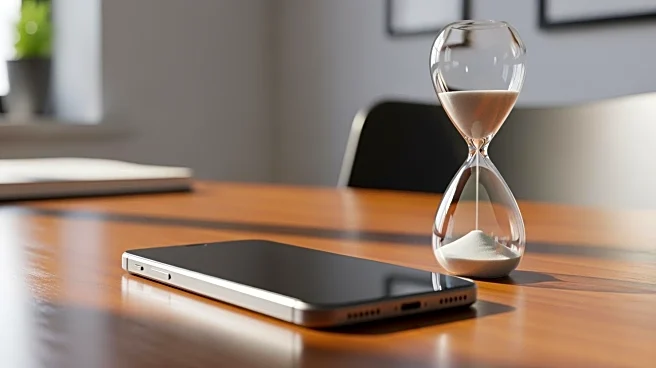What's Happening?
A growing trend among Americans is to retain their electronic devices, such as smartphones and printers, for extended periods, which is impacting economic productivity. According to a survey by Reviews.org,
the average American now keeps their smartphone for 29 months, up from 22 months in 2016. This behavior is driven by economic concerns and the high cost of new devices. However, research from the Federal Reserve indicates that delaying equipment upgrades can lead to a productivity decline of about one-third of a percent annually. This trend is more pronounced in corporations, where outdated technology can hinder efficiency and innovation. Experts suggest that while holding onto devices may seem financially prudent, it can result in a productivity drag, affecting both individual and corporate performance.
Why It's Important?
The prolonged use of aging technology has significant implications for the U.S. economy. As businesses and individuals delay upgrading their devices, productivity suffers, leading to billions of dollars in lost output and reduced innovation. This 'productivity drag' can stifle economic dynamism and competitiveness, particularly for small businesses that lose valuable hours due to outdated systems. The issue is compounded by the need for networks to support older devices, which can slow down overall internet and cellular infrastructure. While some manufacturers, like Apple, continue to entice consumers with new releases, the broader market faces challenges in balancing cost, sustainability, and technological advancement.
What's Next?
To address the productivity issues caused by aging technology, experts suggest a shift towards repairable or modular designs that allow partial upgrades rather than complete replacements. This approach could foster a sustainable circular economy, reducing the financial strain on businesses and individuals. Additionally, policies supporting device refurbishment and extending software support could enhance the second-hand market. As technology continues to advance rapidly, companies may need to adopt leasing models or bring-your-own-device policies to keep pace with innovation without incurring excessive costs.
Beyond the Headlines
The trend of holding onto devices longer reflects broader economic and cultural shifts. Rising prices and sustainability concerns are influencing consumer behavior, prompting a reevaluation of the throw-away culture prevalent in technology consumption. This shift could lead to increased demand for repair services and a more robust second-hand market, potentially creating new economic opportunities. However, it also raises questions about the balance between environmental responsibility and economic growth, as well as the role of government and industry in supporting sustainable practices.








